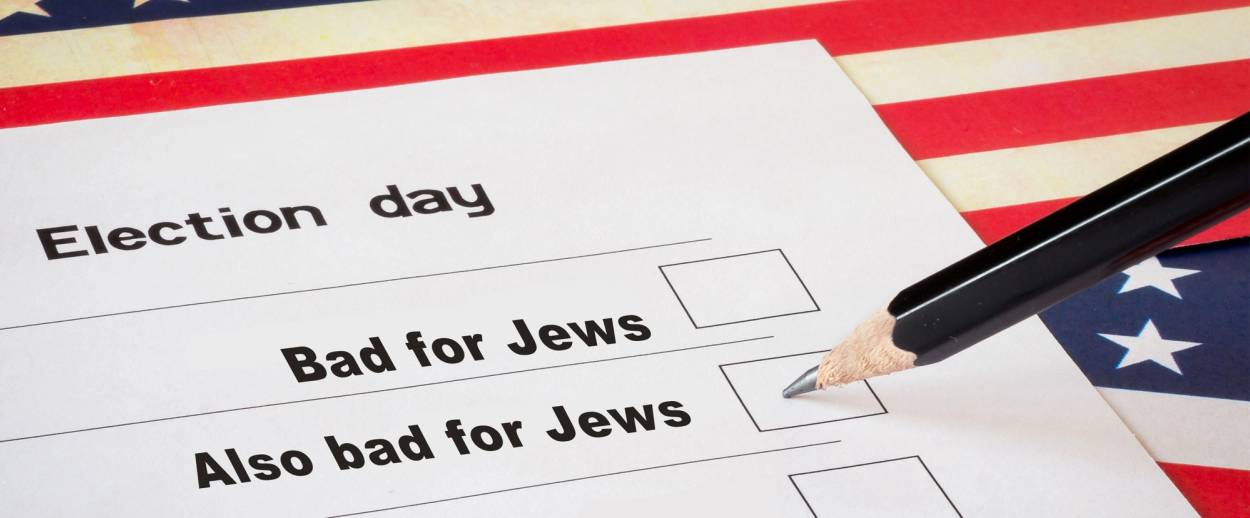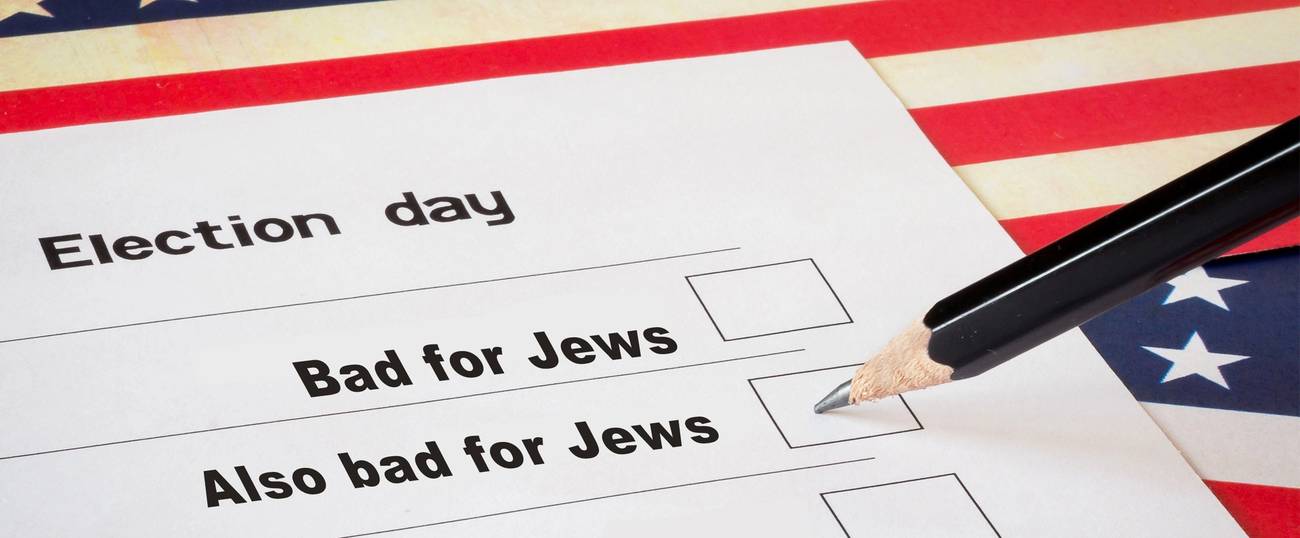No Matter Who Wins in November, the Jews Have Already Lost
No longer at home in either the Democratic or Republican parties, it’s time to acknowledge the end of an era




Let’s get real: No matter what happens in November, America will survive. True, we’ve every right to feel incensed that the choice we now face is between a thoroughly corrupt cynic and a reprehensibly deranged manchild, but we’ve soldiered through worse, and we must believe that for every Millard Fillmore—the artful dealmaker who held on to power by signing the Fugitive Slave Act that mandated the return of escaped men and women to their masters down south—there’s a Lincoln waiting in the wings, trembling with rage and ready to rise. America, as the poet Langston Hughes put it so well, will be America again.
But not for the Jews.
For those of us whose names are now encased in multiple parentheses, the nation will transform this fall, come what may. Clinton or Trump, stinging defeat or close call, divided house or clean partisan sweep—politics will change in ways we cannot even begin to comprehend but it will spell, in nontrivial ways, the end of a more than half-a-century-long American Jewish bloom.
Portents are everywhere. Even Steven Spielberg, the wide-eyed bard of America’s perpetual optimism, recently admitted he was wrong to believe anti-Semitism was fading. “The world,” said the father of Jaws, “is full of monsters.” But the twilight of the Jewish American dream is not a horror movie; it will not come about by the bloody hands of maniacs. Instead, it creeps up on us in a column of a thousand tiny statistics, each easy enough to explain away on its own but none advisable to ignore. The end of Jewish America is everywhere you look.
Look rightward, and you’ll see the Republican leadership trying to rationalize away what, for Jews, ought to be the non-negotiable fact that bigotry must never be tolerated, no matter its targets and no matter the circumstances. Sure, there’s a good case to be made for why the party’s smarting elite is right to have fallen in line with Trump. And sure, it’s silly to expect any political party to pay for its principles with its life. But having chosen to embrace their man, the Republicans must stop equivocating and realize that they’ve no choice but to embrace his throngs as well. With Trump at its helm, the GOP will no longer be the Party of Lincoln or of Reagan. It will be the party of those who think that keeping the Muslims out is fine, of those who cheer on calls to disqualify a judge because of his Mexican heritage, of those who gleefully tweet illustrations of gas chambers and quips about ovens. It will be a party of Huns led by a hardhead. No decent person should join such a party, but Jews have particularly resonant reasons for staying the hell away.
Look leftward, and things are hardly better. There it’s the Rise of the Planet of the Progressives. Look at the college educated, and you’ll see that whereas only 12 percent identified as consistently liberal in 1994, today 47 percent do, which, perhaps, helps explain why two-thirds of Democrats 18 to 34 support Vermont Sen. Bernie Sanders and only a third prefer former Secretary of State Hillary Clinton. Younger Americans, as surveys and studies unfailingly tell us, are slouching toward a more perfect progressive dogma, and the political constellations they’re likely to form will almost certainly not be hospitable to Jews.
This should come as no surprise. Progressivism may be one of most mutable terms in American politics—just what exactly it means changes depending on who’s speaking, when, and to whom. But it’s not much of an injustice to say that progressivism, to borrow a useful insight from the brilliant Yuval Levin, is powered by the twin, and seemingly contradictory, engines of consolidation on the one hand and diffusion on the other: Economically, its supporters champion the regulatory powers of the federal government, while culturally they advocate increased deference to the sensitivities of marginalized individuals. For at least six decades, if not longer, American Jews have traveled more or less in the opposite direction, championing a culture of consolidation that is a necessary backdrop for blending in while supporting moderately liberal economic policies that focused on individuals, not collectives. It’s not a coincidence that the president who enjoyed the greatest support of American Jews in modern history—LBJ, with a whopping 90 percent of the Jewish vote—breathed life into Medicare and Medicaid but also passed a vigorous tax cut for individuals and corporations, believing there were few better ways to encourage spending and stimulate the economy. American Jews, having begun the second half of the 20th century driven by anxiety that the goyim will spot and mock their provincial ways—see under “Eli, the Fanatic” or any other early Philip Roth—ended it so thoroughly and comfortably assimilated as to have successfully infused many of their idiosyncrasies into the culture at large. This instinct, this genius for assimilation, this affirmation of an all-American identity that trumps the rougher, tribal one is precisely what progressivism now heatedly rejects.
You can see this ideological scuffle, strangely, in the brewing fight over Israel in the upcoming Democratic National Convention. By appointing pollster James Zogby and Professor Cornel West to the party’s platform-drafting committee, Sanders—who earlier this week said he saw no real difference between Clinton’s foreign policy and Trump’s—is not signaling a commitment to a concrete agenda but an allegiance to a political mood, one that singles Israel out for calumny because of how maddeningly ill-suited it is to the progressive gospel. Consider, for example, West’s 2014 Facebook rant, in which he called Israeli strikes on Gaza a “massacre of innocent Palestinians” and “a crime against humanity” while condemning Hamas’ rocket attacks as merely “politically ineffective.” You could, of course, chalk the professor’s comments up to anti-Semitism, but progressivism offers a more compelling explanation: Follow contemporary progressivism to its rational conclusion, as West often does in his writing, and there’s no reason why you wouldn’t come to see the cohesive nation-state exercising its right for self-defense as inherently evil and the terrorist group as a band of righteous if misinformed disenfranchised brothers. Even if Clinton is triumphant, Jews should expect this convoluted and toxic logic to grow ever more prominent among Democrats, as it has among the Labourites in Britain. The Democratic Party, too, can no longer be our home.
Which, really, is good news.
Clowns to the left of us, and racists to the right, we American Jews may finally awaken from our 30-year nap and learn again how to be a community that grapples fiercely with big ideas. We can build new institutions that do more than fret about continuity without questioning what, exactly, it is that we should wish to continue. We can set aside the increasingly inane quibbling over minor differences and instead focus on imagining a shared future animated by more audacious common goals. We can, in short, regain the spirit that has propelled us through history—and then grew dormant as we became comfortable in the American mainstream. Let’s face it: We Jews are outsiders. Herein our sorrow, herein our greatness. Imagine what we can do if moved not by the soft tremors of party politics but by the big jolt of feeling, after all these years, politically homeless.
There’s no point in waiting until November. No matter who wins, the Jews have already lost. It’s time now to do what we do best: Shake off the ashes, say a prayer, and rebuild.
***
Like this article? Sign up for our Daily Digest to get Tablet Magazine’s new content in your inbox each morning.
Liel Leibovitz is editor-at-large for Tablet Magazine and a host of its weekly culture podcast Unorthodox and daily Talmud podcast Take One. He is the editor of Zionism: The Tablet Guide.